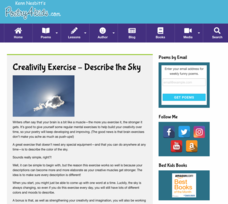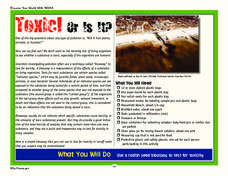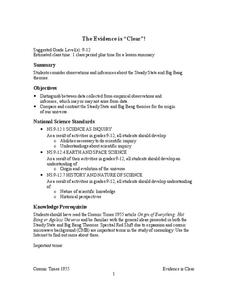American Chemical Society
Liquids - Clearly Unique
Bring chemistry to life for scholars as they perform two tests to examine the unique properties of three liquids. Classroom investigators make observations, develop basic lab skills, and follow step-by-step instructions to compare water,...
J. Paul Getty Trust
Still-Life Painting: Arranging Nature—Lesson 1
Art learners examine still-life arrangement images and respond to a series of prompts. In a whole-class discussion, pupils list elements and qualities that still-life paintings can have. After instructors create an arrangement and model...
CK-12 Foundation
CK-12 Earth Science Concepts for Middle School
Explore a variety of science concepts in an interactive textbook created for middle school scholars. A lengthy table of contents takes readers to pages comprised of a subject overview, outline, and summary. Follow links further to find...
ReadWriteThink
Webcams in the Classroom: Animal Inquiry and Observation
Boost observational skills with an inquiry-based lesson that takes scholars on a virtual field trip. With help from webcams, learners observe animals in a zoo or aquarium. Observations go into a journal and a discussion is held to review...
Poetry4kids
Creativity Exercise - Describe the Sky
Scholars stretch their writing muscles with an exercise that asks them to describe the sky using similes and metaphors.
US Institute of Peace
Nonverbal Communication
What is your body saying that maybe your words aren't? Scholars explore the vast world of the subtle, and not-so-subtle, nonverbal communication cues through group and individual work. Lesson seven in a series of peacebuilding exercises...
American Psychological Association
Counting Fidgets: Teaching the Complexity of Naturalistic Observation
Why do psychologists conduct experiments in controlled laboratory settings? High schoolers gain an understanding of the importance of controls with an activity that involves naturalistic observations with no imposed controls.
US Institute of Peace
Observing Conflict
Can your class manage conflict? Give them the tools they need to succeed at conflict resolution with the third lesson in a 15-part series of peacebuilding activities. Learners draw from personal conflict experience as they analyze...
Nuffield Foundation
Observing Earthworm Locomotion
One acre of land can contain more than a million earthworms. Scholars collect earthworms to observe their movements. Once placed on paper, the sound of movement often fascinates pupils. When placed on glass, the earthworm is unable to...
Freeology
Nature Observations Journal
A journal template makes observing nature a breeze. Super scientists identify an interesting object in nature, draw it, list its details, and compose a written descriptions of their artwork.
Cornell University
Celebrate Urban Birds
Set up a 50x50 square foot area in a space at school and choose three days to go outside and observe the birds seen in a 10 minute span. The activity has learners tapping into their observation skills and creates awareness of the birds...
Cornell Lab of Ornithology
Amazing Birds
What's so amazing about birds? Find out just how amazing birds are with a physics of animal behavior unit created by Cornell Lab of Ornithology. Have learners explore and tap into their observational skills and notice how birds fly, what...
NOAA
Toxic! Or Is It?
Super scientists tests the toxicity of water using radish seed bioassays. Over the course of five days, scholars observe the germination process of several radish seeds, looking closely at their roots to determine the level of toxins...
Science Education Resource Center
Compare and Contrast deciduous and evergreen tree leaves to aid in tree identification
Boost observational skills and get to know the difference between deciduous, coniferous, and evergreen trees with a lesson that challenges scholars to compare, contrast, identify, sort, and draw their findings.
Chicago Botanic Garden
Recognizing Change (Observation vs. Inference)
What is the difference between making inferences and making observations? Young climatologists refer to a PowerPoint to make observations on each slide. They record their observations in a provided worksheet before drawing a...
Polar Trec
Plankton Parents
Plankton are so abundant in the ocean they outweigh all of the animals in the sea. In this three day activity, groups discuss and become familiar with plankton, capture females, and look for egg production on day three.
EngageNY
Types of Statistical Studies
All data is not created equal. Scholars examine the different types of studies and learn about the importance of randomization. They explore the meaning of causation and when it can be applied to data.
Curriculum Corner
I See a School
Give observational and writing skills a boost with a worksheet that takes scholars on a sight-seeing journey around the school. Learners read sentences and color a corresponding picture, then write their own observational sentence and...
Mr. Science
The Scientific Method
First, ask a question and then, do research. Next, form a hypothesis, and conduct an experiment. Make observations, gather and analyze data, and then state a conclusion based on the results. This is the scientific method, and here is a...
NASA
The Evidence is “Clear”!
Do you think you know better? Become a scientist and prove it. Scholars review the evidence for two different theories of the origins of the universe. They notice the empirical observations as well as the inferences to determine which is...
Ohio Department of Education
Observe Then Infer
To develop their skill at drawing inferences from observations, sixth graders rotate through six stations, conduct a series of experiments, make observations, and draw inference from what they observe.
Learning for Life
Exhibition Responsible Citizenship
While we hope our children may never have to witness a crime firsthand, give them the tools to recognize what is happening and respond accordingly. These activities help learners sharpen their observation and memory skills, as well...
Curated OER
Observation and Inference
Assess your young scientists' understanding of the difference between observation and inference with this 20-question multiple choice quiz. It reviews a variety of physics and astronomy concepts, such as solar eclipses and sunspots, the...
abcteach
Community Walk
Invite your pupils to explore their surroundings with a walk around the neighborhood. Learners use their senses to make observations about their surroundings.

























